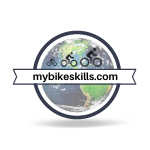About

My name is Jason and I love sharing bicycling. I started mybikeskills.com inspired by Carol Dweck’s work on Growth Mindset and the idea that focusing on our learning process and deliberate practice (skills) can change our lives and our world. Supporting more people to ride bikes more often has been a big part of my life path. Through my work with Dynamic Mindfulness, I have incorporated additional support for the learner’s breath and body sense awareness. Providing a trauma-informed delivery means that I center consent and the learner’s right to choose their steps as they desire. In my sessions with people, we explore where learning with self-awareness, building physical and emotional safety, and supporting the ability to choose. That is to say no and yes (consent) while practicing what it means to be present in our bodies, on bikes, and together. Much of this is built into the process of hands-on learning and the learning environment we create together.
Taking mindfulness and self-regulation skills develops a bit further, what would the world be like if our world was filled with people who had a greater tolerance to the viewpoints of others, could dream of a better world, and go through life in deep connection with themselves? What if learning to use bicycles could train these skills? Learning anything new can be uncomfortable. When someone starts to learn to ride a bike and takes a deep breath and long exhale while noticing their feet on the ground, they connect to their body and feelings while also calming their nervous system. They may become more relaxed and aware of themselves while doing something difficult. They become more integrated while becoming more stress-resilient.
I invite you to pause for a deep breath here if you’d like.
We are at a pivotal time with real and unknown existential threats that we are being forced to address. These include Climate Chaos and the colonial/racist legacy that spawned it, irresponsibly unleashed A.I., our modern lifestyle, and Capitalism destroying the living systems that we are a part of. Can we as the youngest species grow up and survive this phase of our evolution?
What skills and practices can help us cultivate our capacity to sit with the great discomforts of our time, the systems we need to rebuild after they fail, and can we get around in the meantime?
Yes, there are more difficult questions than answers at present. And, our capacity to sit with the difficult questions our our time, how we relate to ourselves, and how we relate to others is crucial to the systems we create or perpetuate.
Mybikeskills is my exploration of these questions and practice. Yes, it is about bicycles, and it is about something greater. If you’re interested in exploring this, let me know on the contact page or book a session.

Mybikeskills.com exists to share training for individuals, parents, and organizations to use bikes as a tool for personal and collective transformation. We achieve this by ensuring that:
1) Learning to ride or teaching someone to ride is a positive, transformation experience.
Around the world, learning to ride a bicycle at any age is a “rite of passage.” The feeling of freedom and flying on wheels is thrilling, beautiful, and can remind us of what we are capable of. Unfortunately, the old way of teaching someone to ride relies upon learning habits that need to be unlearned while trying to learn new ones, at a speed the rider is not in control of while stressing and straining the teacher. Let’s try pausing here and taking a deep breath. Yes, it can work, but there is a much smoother, easier, less traumatic way to learn that works for more learners. Developed by John Waterman in the 1990s, what we will call the “glide, then ride” method works incredibly well and we love sharing it.
2) We share the essential skills for safe and confident road riding.
We recognize that people figure out how to balance a bicycle one way or another. And yet, we notice that very few people who learn to ride are able to make the transition to enjoying the freedom, confidence, and easy parking that comes from being ready to ride on the road. The “Rite Of Passage” falls short of becoming a “Ride of Passage” into greater self-confidence, discovery, and transformative change. The truth is that a limited number of confidence-building skills stand between you, or your rider, and a world of amazing bicycle possibilities. Starting, stopping, signaling, riding in a straight line, scanning/looking behind you, and riding at slow speeds are the physical skills to master and we can guide you through learning them. We can teach you the foundations of safe travel and sharing the road with others. If you already drive a vehicle, we can translate your knowledge to sharing the road when driving and clarify how to confidently and safely travel by bike.
3) We share with you in a way that makes it easier to learn.

Frequently Asked Questions
Training wheels have been used for years however using them can be more stressful and difficult for the learner and teacher compared to learning to glide without pedals first.
We forget skills we don’t practice. Modern neuroscience tells us that the more we practice a skill, the more automatic it becomes. Learning or remembering how to ride a bike is a matter of repetition in a learning environment that works for your unique circumstance.
You are not alone. Come to a workshop or class and learn the essential skills for confident and safe bicycling at your own pace before you ever get out on the road. You will learn the skills for yourself and ways to teach and assess others. You may find that the skills and confidence that come with practice make riding on the road easier to imagine. If and when you are ready, you can join us for a short neighborhood ride.

